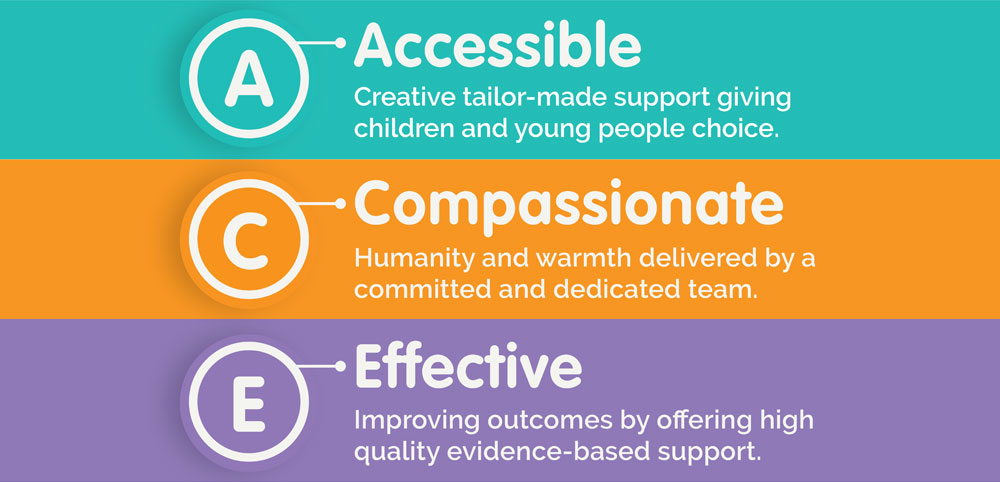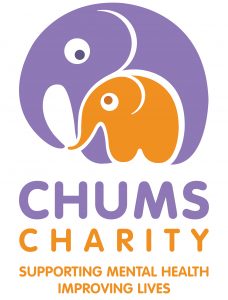Introduction
CHUMS Mental Health and Emotional Wellbeing Service for children and young people provides therapeutic support in a variety of ways. CHUMS has developed a unique service delivery model to ensure that children and young people are able to access a service that supports their individual needs.
Please see the main menu to view what our current service delivery includes.
You can refer to any of our services using the online referral forms relevant to the location where you live and/or the service you require. However, please make sure you read the criteria for the service you are interested in before completing the form.
CHUMS ethos is to support the family as a whole wherever possible and some of our services directly support adults. Our multi-disciplinary clinical team are all well qualified and experienced clinicians. Many of our staff are experienced in more than one area of the service and some have lived experience. It is important to us that all our staff have a passion for making a difference to the lives of children, young people and their families. CHUMS is supported by an amazing group of volunteers who enhance the services we deliver and reflect the communities we serve.
Trauma-Informed Care at CHUMS
In all areas of the service, our aim is to support service users who are experiencing difficulty and distress with sensitivity and understanding. CHUMS pride itself on accessibility to the communities it serves, working flexibly and striving to remove any barriers to client access, whether these be physical, psychological, or related to language or culture. CHUMS use evidence-based treatments to provide effective care for those we support. The CHUMS values align with the person-centred values at the heart of trauma-informed care.
Trauma Informed Care – What is Trauma?
Recognition of Trauma
All staff complete mandatory training in safeguarding, including recognising the signs of abuse. Each service user is assessed using the CHOICE assessment form, which includes routine enquiry into personal and family background, making sensitive enquiry into the service user’s potential experiences of adversity and trauma. When symptoms of trauma are reported, service users are screened for post-traumatic symptoms using measures for adults and children: The Impact of Events Scale (IES/CRIES) and Report of Post-traumatic Symptoms (PROPS/CROPS). Clinical staff with trauma-specific training are available within the team for consultation.
Safety
We takes steps to ensure CHUMS is a safe environment for service users and staff, both physically and in terms of its socio-emotional environment.
-
Admittance to the main building is monitored. Where we work in the community, we adhere to the building access arrangements of the site we are based in.
-
Rooms in the main building are confidential, comfortable, clean, and neutral in presentation. When based in the community, we try to ensure the rooms we use also meet these criteria.
-
Staff are welcoming to service users, providing clear information and instructions in a warm and respectful manner.
-
Staff maintain professional and ethical boundaries.
-
CHUMS adheres to clinical governance.
-
CHUMS staff complete regular mandatory safeguarding training: safeguarding policies are easily accessible to all staff.
-
Clear processes and procedures for each team, so that staff feel confident in their practice.
-
Regular team meetings, clinical supervision and line management meetings support staff to work within their ethical framework, within CHUMS policies and procedures and have opportunities to ask advice.
-
CHUMS operate a C.O.D. (Clinician on Duty) rota so that clinicians are able to seek immediate advice if they have any concerns.
Trustworthiness and Transparency
As an Employee-Owned organisation, with an active Staff Partnership Forum, decisions taken within the organisation are open and transparent, with staff voice valued. In interacting with service users, CHUMS aims to provide a trustworthy and reliable service. Information that service user’s need is given promptly and clearly at each stage of interaction, including explanation of confidentiality; appointment information including how to access the appointment and what will be included in the assessment. Intervention appointments tend to be offered in a predictable, consistent routine (for example, on the same day at the same time). Communication regarding any changes takes place as promptly as possible in a respectful manner.
Collaboration and Choice
CHUMS follows a person-centred approach, working in collaboration with service users. Informed consent is sought to provide support and to share information with other professionals, where required. At assessment, service user needs and preferences are taken into consideration as a treatment plan is agreed between clinicians, service users and/or their families. Service users collaborate on intervention goals. Service users are invited to provide views on their progress and support using Outcome Rating Scales and Session Rating Scales.
Empowerment and Resilience
CHUMS interventions follow a strengths-based approach. We aim to improve the emotional wellbeing of our service users by strengthening support networks, developing emotional regulation skills, and equipping service users with strategies that they can use for ongoing self-management. During the end of care review, service users have the opportunity to reflect upon their progress, consolidate their learning and agree an ongoing plan to maintain their wellbeing.
Staff Wellbeing
All staff, clinical and non-clinical, will interact with individuals and families who have experienced trauma. Being exposed to first-hand accounts of trauma puts staff at risk of secondary traumatic stress. Additionally, staff may have their own personal trauma histories, which may be exacerbated by working with individuals and families who have experienced trauma.
Staff well-being is actively supported at CHUMS, both in formal structures and informal practice:
-
Opportunities for staff to reflect are regularly in place through regular team meetings, line management meetings and annual reviews.
-
All clinical staff attend regular clinical supervision.
-
A ‘Wellbeing Team’ is in place, which promotes wellbeing activities such as mindfulness or movement-based activities.
-
A monthly newsletter ‘VOICE’ is put together and distributed by the Staff Partnership Forum, to communicate good news and developments and maintain staff feelings of connection.
-
Managers communicate regularly with all team members and are accessible through email, Microsoft Teams and via work mobile phones.
-
A ‘Buddy Group’ system is in place, with informal catch ups scheduled on a regular basis. Each Buddy group is made up of members across all teams, supporting staff collaboration and connection within the organisation.
-
An annual staff ‘Away Day’ takes place to build the team and celebrate the effort and achievements of the year.
Partnership with Other Services
At any point along the service user’s journey at CHUMS, it may become apparent that additional or alternative services are required. Service users who have experienced trauma may present with medical/health, social, educational or mental health needs. CHUMS works in partnership with Child and Adolescent Mental Health Services (CAMHS), Early Help, local schools, and local support organisations for vulnerable groups, and may support service users to access support as appropriate. If required, CHUMS staff may need to refer service users to specialist mental health services or social care. Recommendations or referrals to other services are carried out collaboratively with service users: providing full information to them about the process and the rationale/benefits to them, requesting consent and working to ensure a positive transition into that service.
Conclusion
With our commitment to CHUMS values, trauma-informed care provides a framework for ensuring that we are accessible to individuals who have experienced trauma, informed and understanding (which embodies compassion) towards service users and staff who are impacted by trauma, and effective in partnership with our service users so they can engage with the most appropriate support for their needs.
Our Mission
To improve the mental health and emotional wellbeing of children and young people and their families in Luton and Bedfordshire and beyond, enabling positive and fulfilling lives by:
-
Increasing emotional resilience in children, young people, families, and communities.
-
Offering therapeutic support to children, young people and families.
-
Actively engaging service users to influence service delivery.
-
Raising awareness of mental health difficulties through training and campaigning, to reduce stigma and highlight the need for prevention and early intervention.



